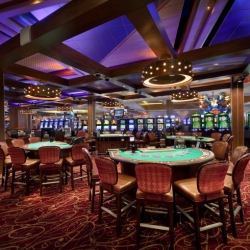The Tampa Bay Times and 10 News WTSP conducted a poll on the subject of gambling. The poll tested the opinions of Tampa Bay residents on a variety of gaming-related subjects.
The questions asked involved whether people wanted to see gambling expanded in the state and whether or not they believed the daily fantasy sports industry should be allowed to conduct business in the state. The TB Times poll showed Tampa residents were evenly split on expanded gambling, but they were heavily in favor of daily fantasy sports.
Deal with Seminole Tribe Allows Expanded Gambling
The expanded gambling question covered the recent agreement between the State of Florida and the Seminole Tribe of Florida and its implications for the future of gambling in the state.
Under the agreement, the Seminoles maintained their monopoly on banked games like blackjack, while being allowed to increase their number of gaming venues in the state. The same deal allowed racetrack-casinos to increase their non-racing gambling, mainly through a variety of gaming machines.
South Florida Casinos
The deal left open the option of one or more South Florida resort-casinos, which were opposed by the Seminoles for years. It also left open for a limited expansion of certain table games at the racinos.
When asked whether Tampa residents agreed with those proposals, 45% favored expanded gambling, while 44% opposed the expansion of gambling in the state. 11% were undecided.
Daily Fantasy Sports
Daily fantasy sports was a poll question, because it has been a national issue for the past two and a half months. Also, in November 2015, a Tampa-area district attorney said he was going to launch a grand jury probe to see whether DFS companies like DraftKings and FanDuel were violating Florida law by accepting real money from Florida players.
Not long ago, daily fantasy sports was seen as a wise investment by legitimate Wall Street hedge funds, entertainment companies, and sports networks. Comcast and NBC Sports were big investors, while the Walt Disney Company was considering a $1 billion investment.
The interest went beyond Wall Street. Famous sports owners like Robert Kraft, Jerry Jones, and Mark Cuban had invested in the business. Every saw the DFS industry as legal under the UIGEA, and a good way to monetize fans’ interest in fantasy sports. DraftKings and FanDuel seemed to advertise everyone on television, radio, and Internet sports programming.
The Rise and Fall of DFS
The ubiquitous ads may have contributed to the discontent. An industry which had flown under the radar for several years was now placed in the spotlight. DFS companies’ ads looked suspiciously like gambling ads to many viewers, and people began to wonder why this pastime was considered legal. Some of those viewers were public officials, who may or may not have been watching alongside their sports-viewing children.
When the Ethan Haskell scandal broke, it was more than just a simple set of questions by the hobbyists and enthusiasts. Suddenly, the American mainstream was focused on DFS gaming. Late night talk shows hosts and comedians did skits about the commercials. The ad campaign backfired, and it backfired in a dramatic fashion.
Support for Legal DFS Gaming
Not everyone thing officials are right in calling for regulations or bans. In fact, the hard core of people offended by the DFS ads or wanting to see the hobby banned is small in Florida. A generation gap also seems to exist.
When asked about DFS gaming, 64% of those questioned said they were either in favor of regulated daily fantasy sports, or they were in favor of leaving DFS “as is” — an operational, unregulated industry. Only 18% of respondents said they would like to see daily fantasy sports banned. Another 18% said they were undecided on the issue.
Younger Generation Prefers More Gaming
The generation gap appeared in the responses. Those under the age of 55 were in favor of expanded gaming. Those over-55 were opposed to more gambling. It appears to show that the generation who grew up with state lotteries and Native American casinos are more open to fully-expanded gambling than those who remember a time when Las Vegas and Atlantic City were the only gaming destinations.
The gender gap was less pronounced, but existed. 51% of men supported more gambling, while 49% opposed it. Those numbers were flipped for women, with 51% opposed to more gambling in the state and 49% approving of such measures. That is within the statistical variables, so there might not be any difference.

